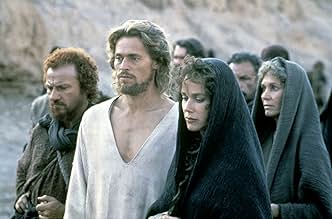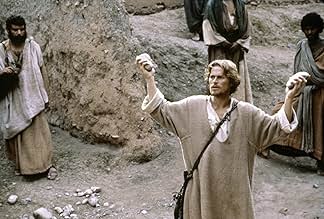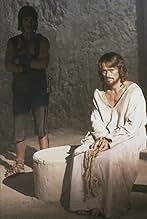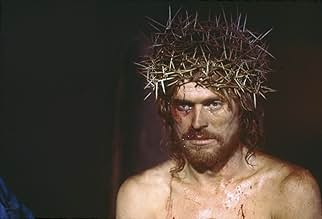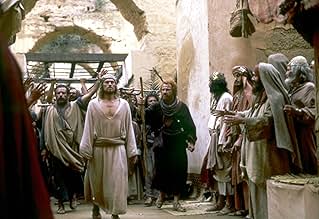La vie de Jésus Christ, alors qu'il affronte toutes les difficultés humaines et sa dernière tentation sur la croix.La vie de Jésus Christ, alors qu'il affronte toutes les difficultés humaines et sa dernière tentation sur la croix.La vie de Jésus Christ, alors qu'il affronte toutes les difficultés humaines et sa dernière tentation sur la croix.
- Director
- Writers
- Stars
- Nommé pour 1 oscar
- 2 victoires et 7 nominations au total
Steve Shill
- Centurian
- (as Steven Shill)
Avis en vedette
I must state before I talk about the movie that I have been a Christian for the last five years. I live my life to be Christlike, as well as I do believe with all of my heart in the story of the gospels.
I must say, of all of the variations I've heard telling the story of Jesus Christ, through seven years of presbyterian school and nineteen years of catholic upbringing, this movie by far offers the most compelling, the most accessible, and is the only one that really makes Jesus out to what I believe him to be.
Supposedly Jesus was the Son of God and supposedly Jesus was a human. So what is wrong with him being tempted as every man is? There is a huge difference between being tempted and actually committing the sin. The miracle of Jesus is that he did not sin. He did not succumb to the carnal desires that all men must invariably do. Yet his struggle to resist temptation as well as find out who He really was makes him all the more human and the story of Christ so much more inspiring.
Scorsese's vision coupled with Willem DaFoe in the best performance of his career capture that struggle and that humanity. And as a result, I've never been more proud to be a Christian.
I must say, of all of the variations I've heard telling the story of Jesus Christ, through seven years of presbyterian school and nineteen years of catholic upbringing, this movie by far offers the most compelling, the most accessible, and is the only one that really makes Jesus out to what I believe him to be.
Supposedly Jesus was the Son of God and supposedly Jesus was a human. So what is wrong with him being tempted as every man is? There is a huge difference between being tempted and actually committing the sin. The miracle of Jesus is that he did not sin. He did not succumb to the carnal desires that all men must invariably do. Yet his struggle to resist temptation as well as find out who He really was makes him all the more human and the story of Christ so much more inspiring.
Scorsese's vision coupled with Willem DaFoe in the best performance of his career capture that struggle and that humanity. And as a result, I've never been more proud to be a Christian.
This adaptation of Nikos Kazantzakis's novel, directed by Martin Scorsese, caused quite a stir on its initial release, accused of blasphemy and of causing offence to the Christian religion.
However, in its depiction of Jesus Christ as a human being rather than a man divine, it gets to the core of his story. This is a man who makes the choice of self-sacrifice for the good of his fellow men, despite the temptations of an alternative life - shown in this film by a life with Mary Magdelene rather than dying at the Crucifixion.
Played by Willem Dafoe with great sensitivity, this Christ performs miracles and discusses the intricacies of life and death with his disciples. Harvey Keitel is Judas, a rough man who fails to understand the significance of being the chosen Son of God; while Barbara Hershey is an effective Magdelene. David Bowie makes a short appearance as Pontius Pilate and is surprisingly good.
'The Last Temptation of Christ' is not one of Scorsese's best films but it certainly sparks questions and leaves food for thought. Some of the imagery is superb and the script is coherent and of a high standard.
However, in its depiction of Jesus Christ as a human being rather than a man divine, it gets to the core of his story. This is a man who makes the choice of self-sacrifice for the good of his fellow men, despite the temptations of an alternative life - shown in this film by a life with Mary Magdelene rather than dying at the Crucifixion.
Played by Willem Dafoe with great sensitivity, this Christ performs miracles and discusses the intricacies of life and death with his disciples. Harvey Keitel is Judas, a rough man who fails to understand the significance of being the chosen Son of God; while Barbara Hershey is an effective Magdelene. David Bowie makes a short appearance as Pontius Pilate and is surprisingly good.
'The Last Temptation of Christ' is not one of Scorsese's best films but it certainly sparks questions and leaves food for thought. Some of the imagery is superb and the script is coherent and of a high standard.
Jesus is plagued by voices in his head and a pain he has that is so intense as to have him in spasms. He has tried fasting and self-harm but neither have worked for very long. He works as a carpenter; one of the few who will make crosses for the Romans much to the annoyance of his acquaintance Judas, a Jewish rebel. Following an appearance by a spirit, Jesus heads into the desert where he experiences temptations and, ultimately, learns the path he must follow. Returning to the real world he starts to speak and gains a following of loyal disciples who believe he is the Messiah. However for every follower, he gets 10 enemies mainly among the religious elite who see him as a heretic and lawbreaker.
When it was released in cinemas and first screened on television in the UK, this film broke all records for complaints and also had the moral majority (?) up in arms over the controversy and the portrayal of Christ. Although I don't want to get drawn into that, the reason I think they are wrong to complain is the same reason I think the film is worth seeing. From the get-go, this film flies its fictional roots and never claims to be the gospel truth (pardon the pun). However what it does is to think around the gospel, to wonder, to suppose, to ask questions something that millions of Christians do every day when they read the bible and contemplate on it. I'm not blind to the offence that this thought process could have but it still provides food for thought and, like the author's quote says, really puts some interesting ideas on the table in regards the dualities of Jesus as both a man and God.
Although this makes it worth seeing in my book and held my interest and engaged my brain throughout this isn't to say it is brilliant, because it isn't. It is overlong and rather plodding at times and could (and should) have lost at least 30 minutes from the running time to be a better film. The dialogue doesn't help that much at times but the delivery is good from a handful of great performances. Although most "Christians" are in love with Gibson's portrayal of Christ recently, Dafoe goes deeper and more complex with a performance where he seems to totally understand the complex motivations that could have run through Christ he is convincing as man and God and his though process is clear and engaging. He is helped by some great support. Specifically Keitel is great and helps bring out a Judas that is the opposite of the greedy failure we are told he is instead he takes the second hardest job; he makes it work really well and dominates his scenes. Support is also strong from Hershey, Argo, Been and Bowie (yes, even Bowie) who all come over with smaller but impressive performances. Scorsese directs with deliberate movements at times but he matches the mood of the period that is well set by sets, costumes and the cool ethnic score.
Overall this is not a great film and if you have no belief or interest in Jesus then I cannot see why you'd bother to get through such a long film that lacks pace. However as spiritual food for thought it is wonderful and really engaged my brain even if you (rightly) dismiss the film as fiction, it is still useful as spiritual debate and providing a view of things that you can study out and draw from. Compared to the thoughtless, cold and spiritually empty film by Mel Gibson 15 years later, this is vastly better and worth seeing if you saw that.
When it was released in cinemas and first screened on television in the UK, this film broke all records for complaints and also had the moral majority (?) up in arms over the controversy and the portrayal of Christ. Although I don't want to get drawn into that, the reason I think they are wrong to complain is the same reason I think the film is worth seeing. From the get-go, this film flies its fictional roots and never claims to be the gospel truth (pardon the pun). However what it does is to think around the gospel, to wonder, to suppose, to ask questions something that millions of Christians do every day when they read the bible and contemplate on it. I'm not blind to the offence that this thought process could have but it still provides food for thought and, like the author's quote says, really puts some interesting ideas on the table in regards the dualities of Jesus as both a man and God.
Although this makes it worth seeing in my book and held my interest and engaged my brain throughout this isn't to say it is brilliant, because it isn't. It is overlong and rather plodding at times and could (and should) have lost at least 30 minutes from the running time to be a better film. The dialogue doesn't help that much at times but the delivery is good from a handful of great performances. Although most "Christians" are in love with Gibson's portrayal of Christ recently, Dafoe goes deeper and more complex with a performance where he seems to totally understand the complex motivations that could have run through Christ he is convincing as man and God and his though process is clear and engaging. He is helped by some great support. Specifically Keitel is great and helps bring out a Judas that is the opposite of the greedy failure we are told he is instead he takes the second hardest job; he makes it work really well and dominates his scenes. Support is also strong from Hershey, Argo, Been and Bowie (yes, even Bowie) who all come over with smaller but impressive performances. Scorsese directs with deliberate movements at times but he matches the mood of the period that is well set by sets, costumes and the cool ethnic score.
Overall this is not a great film and if you have no belief or interest in Jesus then I cannot see why you'd bother to get through such a long film that lacks pace. However as spiritual food for thought it is wonderful and really engaged my brain even if you (rightly) dismiss the film as fiction, it is still useful as spiritual debate and providing a view of things that you can study out and draw from. Compared to the thoughtless, cold and spiritually empty film by Mel Gibson 15 years later, this is vastly better and worth seeing if you saw that.
Has there ever been a more misunderstood film than Martin Scorcese's The Last Temptation Of Christ? Released amid great controversy and accused of being an offensive and unholy film, the truth of the matter is that it is a deeply reverent work which has the courage to ask challenging questions about the pressures and doubts Jesus must have experienced as the appointed Messiah. It also shows the violence of the times in graphic detail. If viewers consider it blasphemous to explore on film the immense burden of duty that Jesus bore through his life, then they are narrow-minded and ignorant. If people feel that to show the brutality and harshness of life in Roman times is tasteless and inappropriate, then they are guilty of glorifying difficult but factual truths. There is NOTHING offensive about this film. There is, however, much that is challenging.
Jesus (Willem Dafoe), an honest carpenter, saves Mary Magdalene (Barbara Hershey) from a stoning. Already dimly aware that he is destined to lead an extraordinary life, he soon finds himself being drawn into the role of a religious figurehead. But Jesus finds it hard to accept that he is a Messiah, and as his reputation and following grows he constantly questions if he is a strong enough man to handle the burden of being God's son. After isolating himself in the desert, where he experiences several hallucinations in which he is confronted by visual manifestations of good and evil, Jesus finally concludes that he IS the true son of God and whole-heartedly sets about imparting his love and wisdom to all who'll listen. Later betrayed to the disgruntled Romans by his friend Judas Iscariot (Harvey Keitel), Jesus is crucified. While on the cross, he imagines what his life would have turned out like if he had shied away from his duty as the Messiah and lived life like a mere mortal.
It is this final section of the film that has provoked the most vociferous outrage. The sequence shows Jesus as he slowly dies on the cross, dreaming of an alternative life in which he sins and copulates and hates like all normal people. Many people have criticised the film on the grounds that these scenes are blasphemous. Such claims are nonsense - the film is not saying that Jesus was a sinner, nor that he gave in to temptation of the flesh, nor still that he was a man filled with hate. The film is merely saying that, in such great pain and so close to death while still just a young man, he might - just maybe - have wondered if it was all worth it. At the end of the film, we see Jesus accept his role knowing that his death is the ultimate act of unselfish love, so the film actually is totally in agreement with what all Christians believe. If the film had come to the conclusion that Jesus's whole life was a waste, his death too, then maybe the detractors would've had cause to complain. But how can they possibly be offended by the film as it stands? For goodness sake, it's a film about absolute faith!!! In truth, The Last Temptation Of Christ is an excellent movie. Compellingly acted, beautifully shot on Moroccan locations, and full of telling ideas, it is a work of real depth and power. The accents are sometimes distracting and some of the dialogue occasionally betrays ill-suited modernisms, but apart from these minor drawbacks it is one of the most important and thought-provoking films ever made.
Jesus (Willem Dafoe), an honest carpenter, saves Mary Magdalene (Barbara Hershey) from a stoning. Already dimly aware that he is destined to lead an extraordinary life, he soon finds himself being drawn into the role of a religious figurehead. But Jesus finds it hard to accept that he is a Messiah, and as his reputation and following grows he constantly questions if he is a strong enough man to handle the burden of being God's son. After isolating himself in the desert, where he experiences several hallucinations in which he is confronted by visual manifestations of good and evil, Jesus finally concludes that he IS the true son of God and whole-heartedly sets about imparting his love and wisdom to all who'll listen. Later betrayed to the disgruntled Romans by his friend Judas Iscariot (Harvey Keitel), Jesus is crucified. While on the cross, he imagines what his life would have turned out like if he had shied away from his duty as the Messiah and lived life like a mere mortal.
It is this final section of the film that has provoked the most vociferous outrage. The sequence shows Jesus as he slowly dies on the cross, dreaming of an alternative life in which he sins and copulates and hates like all normal people. Many people have criticised the film on the grounds that these scenes are blasphemous. Such claims are nonsense - the film is not saying that Jesus was a sinner, nor that he gave in to temptation of the flesh, nor still that he was a man filled with hate. The film is merely saying that, in such great pain and so close to death while still just a young man, he might - just maybe - have wondered if it was all worth it. At the end of the film, we see Jesus accept his role knowing that his death is the ultimate act of unselfish love, so the film actually is totally in agreement with what all Christians believe. If the film had come to the conclusion that Jesus's whole life was a waste, his death too, then maybe the detractors would've had cause to complain. But how can they possibly be offended by the film as it stands? For goodness sake, it's a film about absolute faith!!! In truth, The Last Temptation Of Christ is an excellent movie. Compellingly acted, beautifully shot on Moroccan locations, and full of telling ideas, it is a work of real depth and power. The accents are sometimes distracting and some of the dialogue occasionally betrays ill-suited modernisms, but apart from these minor drawbacks it is one of the most important and thought-provoking films ever made.
This is one of the greatest movies I have ever seen! I was amazed with all of the performances. This is certainly one of Martin Scorsese's great accomplishments in his extensive and highly acclaimed carrier. This movie was very important to Scorsese and he would put it off several times because he felt he wasn't ready to do it. I think that the wait was worth it, because this was an outstanding movie.
This is one of those movies that you either really liked, or really didn't like. Most of the people who didn't like this found it to be a mockery of the Gospels and Christ himself. I liked it because it did follow the Bible very closely, it was a fantastic telling of Jesus Christ's last days and his greatest accomplishments, and because the acting was very good.
I thought Willem Defoe was spell binding as Jesus Christ. Some people will say that he wasn't enough like Jesus, but you do have to realize that this is probably the hardest character to play and I think that Defoe did the best job that anyone could have done at playing Christ. Harvey Keitel did an equally excellent job at playing Judas, Jesus's best friend, who eventually betrays Him so the world can be saved. This may be Keitel's best performance (if not, it is one of the three). Barbara Hershey was also a great supporting roll as Mary Magdalene.
This movie is certainly not for everyone. Many people with very strong religious convictions will see this movie as offensive, simply because Christ is portrayed a frightened man who sees his fate as a burdon through 'half' of the film, and I implicate the word 'half' for a reason. For everyone else, I say go rent this, because this is a powerful and magnificent version of the final months of Christ. When you watch this, you just might have to wonder (I know I did), what will be the last temptation of Christ? 10/10
This is one of those movies that you either really liked, or really didn't like. Most of the people who didn't like this found it to be a mockery of the Gospels and Christ himself. I liked it because it did follow the Bible very closely, it was a fantastic telling of Jesus Christ's last days and his greatest accomplishments, and because the acting was very good.
I thought Willem Defoe was spell binding as Jesus Christ. Some people will say that he wasn't enough like Jesus, but you do have to realize that this is probably the hardest character to play and I think that Defoe did the best job that anyone could have done at playing Christ. Harvey Keitel did an equally excellent job at playing Judas, Jesus's best friend, who eventually betrays Him so the world can be saved. This may be Keitel's best performance (if not, it is one of the three). Barbara Hershey was also a great supporting roll as Mary Magdalene.
This movie is certainly not for everyone. Many people with very strong religious convictions will see this movie as offensive, simply because Christ is portrayed a frightened man who sees his fate as a burdon through 'half' of the film, and I implicate the word 'half' for a reason. For everyone else, I say go rent this, because this is a powerful and magnificent version of the final months of Christ. When you watch this, you just might have to wonder (I know I did), what will be the last temptation of Christ? 10/10
What Scorsese Film Ranks Highest on IMDb?
What Scorsese Film Ranks Highest on IMDb?
Cinema legend Martin Scorsese has directed some of the most acclaimed films of all time. See how IMDb users rank all of his feature films as director.
Le saviez-vous
- AnecdotesWillem Dafoe could not see for three days, because he got too many eye drops to dilate the pupils of his eyes in bright sunlight to achieve a superhuman effect.
- GaffesWhen the first man is being crucified, as he yells when the soldier nails his hand, we can see a lot of metal fillings in his upper teeth.
- Générique farfelu"This film is not based upon the Gospels but on this fictional exploration of the eternal spiritual conflict."
- Autres versionsMost DVD and streaming versions are missing Judas's line, "It's Magdalene; she deserves it," right before the attempted stoning scene. The line can be heard on the Criterion Blu-ray.
Meilleurs choix
Connectez-vous pour évaluer et surveiller les recommandations personnalisées
Détails
- Date de sortie
- Pays d’origine
- Langue
- Aussi connu sous le nom de
- The Last Temptation of Christ
- Lieux de tournage
- Moulay Ismael Stables, Villa Imperiale, Meknès, Morocco(Pontius Pilate's palace - Passover baths - interiors: the Temple)
- sociétés de production
- Consultez plus de crédits d'entreprise sur IMDbPro
Box-office
- Budget
- 7 000 000 $ US (estimation)
- Brut – États-Unis et Canada
- 8 373 585 $ US
- Fin de semaine d'ouverture – États-Unis et Canada
- 401 211 $ US
- 14 août 1988
- Brut – à l'échelle mondiale
- 8 866 379 $ US
- Durée2 heures 44 minutes
- Couleur
- Rapport de forme
- 1.85 : 1
Contribuer à cette page
Suggérer une modification ou ajouter du contenu manquant

Lacune principale
What is the Hindi language plot outline for La dernière tentation du Christ (1988)?
Répondre

